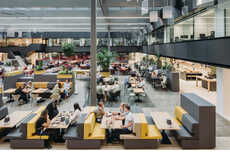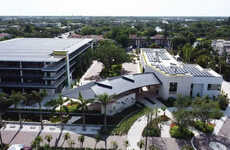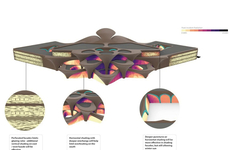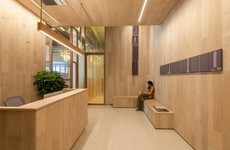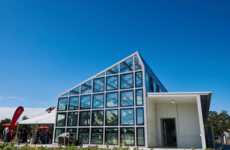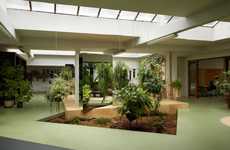
Indira Paryavaran Bhavan is India's First Net Zero Energy Building
Rahul Kalvapalle — November 13, 2014 — Eco
References: moef.nic.in & thehindu
Indira Paryavaran Bhavan is a building, located in the Indian capital New Delhi, that uses energy-efficient construction materials and solar passive design, making it the country's first ever net zero energy building.
The building is equipped with a fancy robotic parking system that can accommodate 330 cars. Its computing devices consist of thin-client networking systems rather than regular desktop computers, helping further minimize energy consumption.
The building is capable of utilizing up to 75% of natural daylight to reduce energy consumption. It also happens to have the largest rooftop solar system among multi-storied buildings in India, and makes use of low-discharge water fixtures and grey water recycling systems to minimize water consumption.
Indira Paryavaran Bhavan is also entirely accessible for people with physical disabilities, a rarity among buildings in India.
The building is equipped with a fancy robotic parking system that can accommodate 330 cars. Its computing devices consist of thin-client networking systems rather than regular desktop computers, helping further minimize energy consumption.
The building is capable of utilizing up to 75% of natural daylight to reduce energy consumption. It also happens to have the largest rooftop solar system among multi-storied buildings in India, and makes use of low-discharge water fixtures and grey water recycling systems to minimize water consumption.
Indira Paryavaran Bhavan is also entirely accessible for people with physical disabilities, a rarity among buildings in India.
Trend Themes
1. Energy-efficient Construction Materials - Opportunity for developing and supplying innovative and sustainable building materials that can significantly reduce energy consumption in buildings.
2. Solar Passive Design - Potential for designing buildings with optimized solar orientation and natural ventilation systems to maximize energy efficiency.
3. Robotic Parking Systems - Disruptive innovation opportunity in the development of automated parking systems that can optimize space utilization and reduce energy consumption.
Industry Implications
1. Building Materials - Opportunity for manufacturers to produce and market energy-efficient construction materials in response to the growing demand for sustainable buildings.
2. Architecture and Design - Industry professionals can leverage solar passive design principles to create energy-efficient buildings and offer sustainable solutions to clients.
3. Parking Systems - Potential for technological advancements in robotic parking systems to revolutionize parking infrastructure and improve energy efficiency in urban settings.
4.1
Score
Popularity
Activity
Freshness

